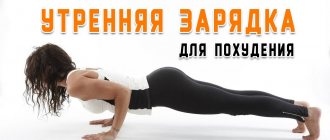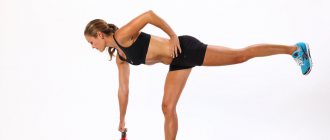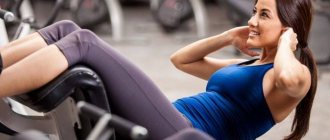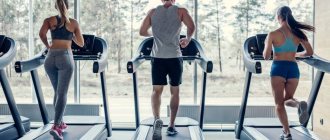How to start playing sports on your own
If you have never exercised or played sports before, starting such exercises on your own without an instructor can be dangerous. This is especially true for people who have health problems or are overweight. Hiring your own personal trainer can be quite expensive. Not everyone can go to the gym either, since this requires not only money for a subscription fee, but also time. But don’t let this become an obstacle, since in the age of technology all the necessary information can be found on the Internet.
Online health courses will help you find exactly what you need. Where to start, how to maintain results, how to lose weight or pump up a certain muscle group.
Counterarguments versus excuses
How to get rid of excuses that constantly prevent you from making sports part of your lifestyle? Let's talk about the arguments that will allow you to stop making excuses and start making changes now.
- Lack of free time. This excuse is the most common. However, everyone finds time to regularly spend time on social networks and read all the news. Why not use this time for sports? Sports activities do not require hours of training. 2-3 hours a week is enough to maintain health and a beautiful figure.
- Expensive season tickets and sports equipment. Yes, there are some. But there are also budget options. Fitness centers are also fighting for customers, offering very “tasty” conditions for purchasing memberships. Sports stores have affordable dumbbells, jump ropes, bands, and more.
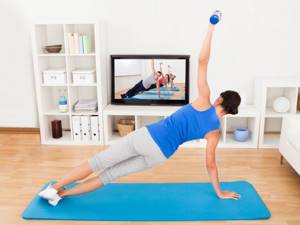
- Inconvenient location of centers and halls. Of course, I wouldn’t want to waste time on the road. There is a way out of this situation - the courtyards are equipped with playgrounds and sometimes exercise equipment; a light jog can be done within the block. Buying a pair of dumbbells or a stretch band for home is also a great option: they don’t take up much space and are available for training at any time.
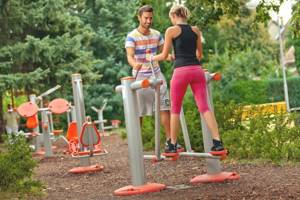
- We didn’t get the desired result in previous training sessions and were disappointed. When playing any sport, regularity and consistency are important. With loads from time to time there will be no result. It is important to take into account the individual characteristics of each organism and select the appropriate load.

- Fatigue is a natural process of the body. No matter how strange it may sound, moderate physical activity helps relieve mental and physical fatigue. Do exercises in the morning if you come home late. Do stretching exercises in the evening. On weekends, get out into the fresh air for walking, roller skating, cycling in the warm season, or skating and skiing in winter.

Any reason to start training “on Monday” is just an excuse. By putting off sports, you are putting off making a useful contribution to your health.
Why do you need sports?
Exercise improves the overall health and well-being of most people. There are many reasons why every person should exercise - to reduce body fat, strengthen bones, increase endurance and flexibility. These are just a few reasons why you should take up exercise.
Exercise helps reduce body fat and control body weight. Sport allows us to enjoy how our figure, coordination of movements, flexibility and endurance changes, and helps fight depression and anxiety. In general, this is a great way to spend family time.
The connection between physical activity and good health has already been confirmed in many official medical publications from different countries. Numerous studies have proven that moderate but regular exercise has beneficial effects on health and even the psyche.
Exercising has many benefits, and today we'll share 25 of them. We are talking not only about a beneficial effect on appearance, but also about life in general.
1. Playing sports increases life expectancy.
Research shows that an active lifestyle can increase life expectancy by up to 1.8 years.
2. Sports reduce the overall number of injuries.
The more a person exercises, the less prone they become to injury as they develop posture, balance and strength.
3. Sports reduces anxiety levels.
Exercise relieves anxiety in the same way it reduces stress and improves mood, by promoting the release of endorphins.
4. Exercise can help you cope with depression.
Many studies show that regular exercise benefits people who suffer from depression. Because the body releases endorphins during exercise, exercise promotes positive feelings and helps prevent depression.
5. Exercising increases self-esteem
. Exercise helps improve self-esteem by creating a positive body image that is healthier, fitter, and more aesthetically pleasing.
6. Working out improves your mood.
Research shows that regular exercise is an effective way to improve your mood. When a person begins to exercise, their heart rate increases and the brain releases chemicals that promote a good mood and create a feeling of well-being and euphoria, while calming the stressed-out neurons in the brain that cause a bad mood.
7. Exercise reduces stress
. Exercise and stress are directly related to each other. In almost any form, exercise can act as a stress reliever as it helps increase levels of positive endorphins in the body.
8. Exercise improves motor ability in people who suffer from arthritis.
Health experts recommend a special exercise program for people who suffer from arthritis. This program includes exercises that relieve pain and stiffness caused by this disease. These exercises are also designed to reduce joint pain and improve joint flexibility.
9. Exercising reduces the risk of obesity.
One of the main factors that contribute to obesity is a sedentary lifestyle. When a person lacks physical activity, they tend to want to eat more, which results in weight gain (and it doesn't help that you're not burning extra calories).
10. Exercise improves metabolism.
A faster metabolism helps burn fat, and one of the safest ways to speed up your metabolism is to increase muscle mass. Muscle cells are eight times more metabolically active than fat cells, meaning muscle burns more calories than fat.
11. Exercise slows sarcopenia
. Regular exercise plays an important role in controlling the underlying processes of sarcopenia, which refers to a condition in which muscle gradually disappears as we age. According to medical experts, exercise is the primary treatment for this condition, especially strength and weight training.
12. Sport improves musculoskeletal health.
Exercise improves musculoskeletal health because it allows muscles to significantly increase in size and strength.
13. Exercise improves bone mineral density and reduces the risk of osteoporosis.
Health experts recommend daily exercise for people who suffer from osteoporosis. Exercising on a regular basis helps improve bone mineral density as it helps increase and maintain bone density. Types of exercise that are ideal for patients with osteoporosis include resistance training, flexibility exercises, and strength training.
14. Sports makes you smarter
. Research has shown that exercise is directly related to how smart you are. In fact, recent research in neuroscience suggests that exercise does more to stimulate thinking than thinking itself does, creating a brain that resists physical shrinkage and improves cognitive flexibility.
15. Exercise reduces the risk of colon cancer.
People who spend more time walking and participating in other physical activities are less likely to be diagnosed with colon cancer than those who do not. Additionally, research shows that physically active people who develop colon cancer have a higher chance of survival because their levels of insulin and other hormones in the body are well regulated.
16. Exercising reduces the risk of developing breast cancer.
Research shows that women who exercise regularly are less likely to develop breast cancer. Because exercise helps with weight management, postmenopausal women who exercise regularly are leaner and have lower levels of estrogen, which is a major factor in breast cancer prevention.
17. Exercise reduces the risk of stroke.
An active lifestyle reduces the risk of stroke by as much as 80 percent because it improves blood vessel health.
18. Exercise improves high-density lipoprotein (good cholesterol) levels.
While exercise helps reduce cholesterol levels, it also helps increase good cholesterol levels. HDL, or high-density lipoprotein, takes excess cholesterol from the blood and carries it to the liver, where it is broken down. The more a person exercises, the higher their HDL levels become.
19. Exercising lowers total cholesterol levels.
When a person is overweight, they tend to have higher levels of low-density lipoprotein in their blood, which is a type of cholesterol that is associated with heart disease. The more a person exercises, the more weight he loses and gets rid of bad cholesterol.
20. Exercise improves blood triglyceride levels.
Regular aerobic exercise is an effective way to reduce levels of bad triglycerides in the blood, which are a major risk factor in the development of cardiovascular disease. Additionally, while strength training does not lower triglyceride levels on its own, it does add more muscle to your body. Extra muscle means your body will burn more calories, which will lead to weight loss, which in turn will be reflected in lower triglyceride levels.
21. Exercise lowers blood pressure.
Exercise is one of the best ways to lower blood pressure. By jogging or going to the gym on a regular basis, a person strengthens his heart and a strong heart pumps blood with less effort. The less effort the heart has to make to pump blood, the lower your blood pressure.
22. Exercise improves glucose metabolism.
When a person exercises, their hormonal levels are shifted and homeostasis is disrupted. This disorder accelerates the metabolism of glucose (sugar) in the body, as well as other molecules that carry energy value. Thus, glucose can provide energy to various cells and tissues.
23. Exercise reduces the risk of developing diabetes.
According to recent research, exercise reduces the risk of diabetes in women by 33 percent.
24. Exercising also helps you control diabetes.
. Exercising also helps the body use insulin more efficiently.
25. Exercise helps improve cardiovascular health.
Research shows that physical activity is directly related to cardiovascular health and helps prevent cardiovascular diseases such as coronary artery disease (CHD).
Source
Useful tips - what is important to remember
When playing sports, remember to listen to your body. If you often feel drained and exhausted, or experience muscle and joint pain, chances are you've been overdoing it. Excessive stress for which you may not yet be ready can result in injury. What you eat or drink is also important (especially for weight loss). Water is an essential ingredient for active people. Drink it before, during and after training. When starting intense exercise, you may need to change your daily diet in favor of proteins and carbohydrates. Consult your doctor to rule out any contraindications.
Does everyone choose the type of activity for themselves?
When choosing a sport, you should listen to your body. Don’t be afraid to try yourself in different directions - activities should bring pleasure and satisfaction, and not drag down your mood and well-being. Each sport brings different benefits:

1. Running. For some reason, this type of physical activity is often left aside as not bringing a quick effect. But in vain, if you want to have a healthy heart without the risk of it stopping after 40 years, running is a faithful assistant for this. Once you achieve certain results, you will experience increased muscle tone, weight loss and a significant increase in energy. 2. Cycling brings great benefits. It improves blood circulation, the functioning of the heart, lungs and organs of vision, trains the vestibular apparatus, and also prevents the appearance of varicose veins. 3. Skiing can replace cycling in the cold season. The benefits of this activity are not inferior to the options described above. 4. For those who are contraindicated for strong physical activity, there is also a sport - swimming. It will bring the body into the desired shape and help the respiratory and cardiovascular systems work. Swimming has no age restrictions. Orthopedic doctors often prescribe this sport for the treatment and prevention of spinal curvature and other diseases in children.

5. Similar beneficial effects can be felt during dance or yoga classes. In addition to general strengthening of the body, they will make the body flexible and elastic. 6. Exercises in the gym. This choice is for those who want not only to improve muscle elasticity, but also to build muscle mass. This option, like group fitness classes, is suitable only for those people who have no medical contraindications. 7. If you wish, you can focus on sports games. This could be badminton, tennis or squash. All such activities perfectly train all muscle groups and charge you with energy. By playing, you can improve your health and at the same time achieve great victories.
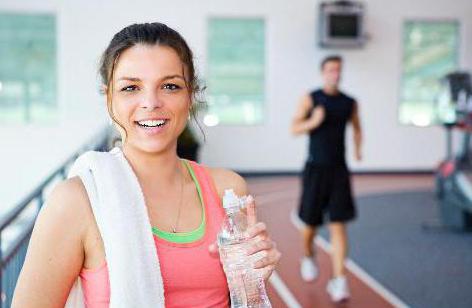
8. Everyone's favorite football is a game that trains strength and endurance. Contrary to the belief that these are activities for men, there are even teams for girls. Football perfectly develops and supports both a growing organism and an already formed one.






